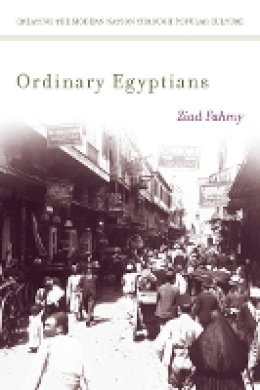Ziad Fahmy is Assistant Professor of Modern Middle East History at Cornell University.
"His book poses probing questions about the sources used to trace the emergence of Egyptian national identity, as well as the cultural and linguistic assumptions underlying the reading of these sources. . . [P]erhaps the signal contribution of this book is its emphasis on the oral/aural dimension of the nationalist movement, which has certainly not been given its due in historical treatments of Egypt's identity debates. . . Ordinary Egyptiansofferes a stimulating and valuable re-examination of the formative decades of Egyptian nationalism."—Michael J. Reimer, American Historical Review "Ziad Fahmy's Ordinary Egyptians offers a compelling alternative to an existing historiogrpahy that has mostly explored Egyptian nationalism from the vantage of elite culture."—Aaron Jakes, Arab Studies Journal "[Fahmy's book] provides a model for creative but very solid historical studies. Fahmy asks an important question: What role did popular culture play in the formation of the modern Egyptian nation? He plunges into very real controversies over the vernacular versus literary Arabic and makes a clear and persuasive, though inevitably controversial case for that incredibly supple and quite beautiful Egyptian spoken dialect."—Raymond William Baker, Middle East Journal "Fahmy's work is a well-written and compelling argument to expand our thinking on the formation of Egyptian nationalism. By looking at new sources, found in the written and spoken colloquial Egyptian of everyday Egyptians, Fahmy has greatly added to the historiography of this topic. The author also shows that we must move beyond our Western European-centric notions of linguistic cultural nationalism if we are to wholly understand the formation of nationalism in the Arab world."—Kelly M. McFarland, Washington Independent Review of Books "This is truly an excellent and original book. Fahmy deconstructs commonly held assumptions regarding the formation of nationalism, particularly in its early stages, providing a thought-provoking contribution to our understanding of how agents propelled the formation of nationalism in Egypt in the late nineteenth and early twentieth century. Its contribution to the field is indispensable."—Israel Gershoni, Tel Aviv University "This refreshing new work fills a significant gap and opens a path for further research on how class and literary taste functioned in the early stages of Egyptian national identity formation. Fahmy places the vernacular more squarely in the center of discussions of the history of Egyptian nationalism and marks out useful signposts in showing how expressive culture articulates with other developments."—Walter Armbrust, University of Oxford "Ordinary Egyptians is a gem in the collection of works on modern Egyptian history. Fahmy covers the rich topic of the colloquial media in Egypt when khedives and then the British governed Egyptian society, spotlighting those who wrote for newspapers, the theater, and the radio. An important book."—Eve Troutt Powell, University of Pennsylvania

